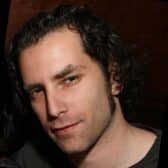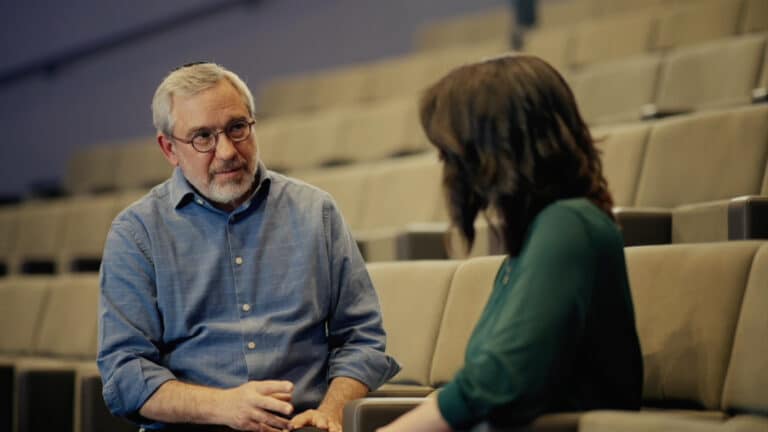
In the powerful new documentary “Tragic Awakening: A New Look at The Oldest Hatred,” executive producer Rabbi Shalom Schwartz reminds us that on Passover, Jews read from the Haggadah that in every generation, an enemy rises to try to destroy them. Yet while four questions are traditionally asked at the Seder, one fundamental question remains unspoken: “Why is there so much Jew-hatred?”
In “Tragic Awakening,” Rawan Osman — a former antisemite turned Zionist — and Rabbi Raphael Shore, the film’s producer and Executive Chairman of OpenDor Media, confront this question with bold honesty and insights rarely voiced in mainstream discourse.
From Jew hater to becoming Jewish
The film opens with Osman’s remarkable journey. Born in Damascus to a Syrian father and a Lebanese mother, and raised in Lebanon, growing up, she idolized Hezbollah and internalized antisemitic tropes. But after moving to France, her worldview began to unravel. She recalls experiencing a panic attack the first time she encountered a Jewish person in public.
“I was told that the Jews are evil, and they hate everyone,” Osman says in the documentary, adding that she was taught the Holocaust was a lie.
Her transformation began when she joined the first Arab International delegation to visit Auschwitz. She now lives in Germany and runs a social media platform called Arabs Ask, aimed at debunking anti-Israel and antisemitic myths — especially after the Oct. 7 attacks. Her evolution from antisemite to Zionist led her to begin the process of converting to Judaism.
In the film, she visits Israel and reflects on the horrors of the Hamas massacre: “This doesn’t look like ‘Never Again’ to me,” she commented while touring one of the attacked sites.
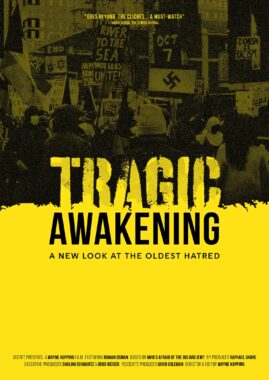
“October 7 tore the world apart,” Osman says in the documentary, noting with dismay how quickly sympathy for Israel gave way to justification of Hamas’s atrocities.
“On which planet is rape justified?” she asks, bewildered at how educated people could defend the terrorist group.
Osman, who has visited Israel nine times, pulls no punches. She criticizes Qatar for harboring Hamas leaders, slams Iran for funding terror, and calls out Egypt, Jordan, Lebanon, and Syria for their complicity or silence. She even urges Syria to return the body of Israeli spy Eli Cohen, who was publicly executed in 1965.
Antisemitism: A deeper, darker pattern
Rabbi Shore, whose work underpins much of the film’s thesis, argues that antisemitism cannot be reduced to simple scapegoating or dismissed by flippantly concluding that Adolf Hitler was merely insane. Drawing on his research from the book “Who’s Afraid of the Big Bad Jew?” Shore explores the ideological consistency behind Hitler’s obsession with Jews.
Shore writes that Hitler was of the foul belief that humans should be like animals and exist under a pro-eugenics “survival of the fittest” mentality. His writings in “Mein Kampf” were evil but consistent with his genocidal policies.
“The entire academic world came up with that narrative that Hitler was a madman with no coherent thoughts,” Shore told Unpacked. “And people think it was an aberration and that antisemitism is just another form of racism. That’s false. Hitler was afraid of the Jews. He believed in ruthless social Darwinism — Jewish humanitarianism, love and equality were a great threat to that.”
Shore insists that antisemitism is not just another form of racism but a unique and ancient hatred.
“Hitler feared the Jews not as a physical threat but as a spiritual and a moral one,” Shore said. “If you read what Hitler said, it was that the battle of the German and the Jew was the central battle, and everything else was façade and illusion.
Are Jews the “chosen people” — or the chosen scapegoats?
The Talmud, Shore explains, teaches that by accepting the Torah at Mount Sinai, the Jewish people received not only divine wisdom but also an inevitable burden — sinah, or hatred. The name “Sinai” itself, he notes, is linked in Hebrew to the root of the word for hatred.
The giving of sinah at Sinai meant “it will be a rough road. The world is going to resist. That resistance is called antisemitism,” Shore explains in the film.
One of the frequent accusations hurled at Jews is the belief that calling themselves “the chosen people” implies superiority.
“More than half the planet thinks they are the chosen people,” Shore said. “But at the end of the day, it’s only the Jews who are persecuted for calling themselves the chosen people. We are the people others find evil in any generation gives us the indication that perhaps they know who we really are and that we are meant to fight for moral accountability.”

Throughout the documentary, clips are interspersed of Jewish journalist Bari Weiss, commentator Douglas Murray, Israeli influencer Rudy Rochman, and the late Lord Rabbi Jonathan Sacks demonstrating the contradictory nature of the conspiracies that form the basis of antisemitism. Jews are hated for being too rich and too poor, for being assimilated and too different, for not having a state and for having one. The documentary shows how modern antisemitism and anti-Jewish scapegoating have been rebranded as anti-Zionism to remain socially acceptable.
The documentary presents harsh truths
Directed by Wayne Kopping, “Tragic Awakening” delivers unflinching truths. The film stresses that antisemitism isn’t an incidental hatred — it was a central obsession of Hitler, who diverted military resources in the late stages of World War II just to continue murdering Jews. Neither Hamas nor Iran asks if Jews are religious or secular before targeting them. It’s enough that they’re Jewish.
Early in “Tragic Awakening,” we hear audio from Oct. 7 in which a terrorist brags not that he killed ten Israelis, but that he killed “ten Jews.”
“I think that the mask is off for the most part,” Shore said. “But I don’t trust that it will stay off because of the underlying psychological biases. For the short term, that was one of the real wake-up calls for Israelis. But how do you explain that Jews on campus, whether they were involved in Israel or not, suddenly became a target after October 7? They’re not Israelis, but they’re Jewish.”
The film features clips of podcaster Joe Rogan and commentator Bill Maher trying to grapple with antisemitism. Maher calls it a “volcano that blew,” while Rogan admits he simply doesn’t understand where it comes from.
Shore points to the damaging falsehoods being spread in the name of “human rights,” such as the claim that Israel is committing genocide.
“I think it’s tremendously damaging, and I think we should push back on it, but it’s a very difficult battle we’re facing,” Shore said. “This is an issue of the overall media.”
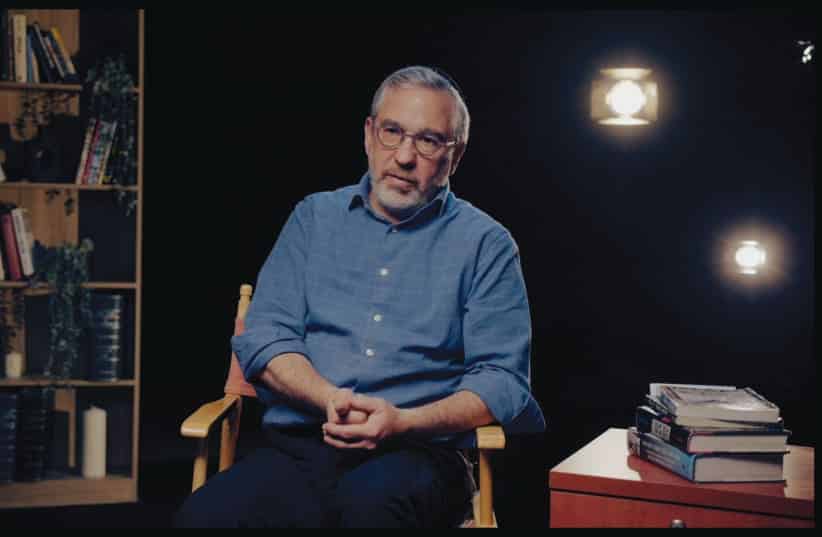
Believe enemies when they speak
Rather than do mental gymnastics, the documentary suggests that those who express antisemitic beliefs should be taken at their word and points to Hamas leaders and a terrorist sympathizer declaring there should be more Oct. 7 attacks. Hitler was clear in ‘Mein Kampf.” Iranian leaders are clear when they say Israel should be wiped off the map or erased from time, are not hyperbolic, Shore argues.
“When evil people tell Jews their intentions, we have learned we should believe them,” Shore said.
Historian Rabbi Ken Spiro adds that the way a society treats Jews is a litmus test for its moral health. If unchecked, hatred of Jews eventually spreads to others. Weiss echoes this sentiment, saying, “The fact that antisemitism is rising in America says nothing about Jews. It says everything about America and where we are right now.”
Why this is one of Shore’s most important films
Shore, who has produced about 18 films, believes “Tragic Awakening” may be his most important project to date.
“This one cuts to the core of what I think the Jewish people need to be facing,” Shore said, adding that the documentary challenges the most common narratives in a way he believes will help curb antisemitism. “If people deal with and grapple with the themes of the documentary and the book, it can have a big impact on the next generation.”
In one chilling moment, Israeli soldiers are shown discovering copies of “Mein Kampf” on the bodies of Hamas terrorists. Murray comments that it’s not hyperbole to say Hamas would finish Hitler’s job — if they had the means.
“We have to accept that there is objective evil in this world,” Osman, who now lives in Germany, says in the documentary.
Shore’s warning is clear: denial will only make things worse. One of his most poignant lines from the book is included in the film: “The deepest victory over Hitler and antisemitism comes when the Jews stop defining themselves by this hatred and instead embrace what makes us strong, what makes us great, and what our mission is. Our real education begins not when we escape antisemitism but when we confront it.”
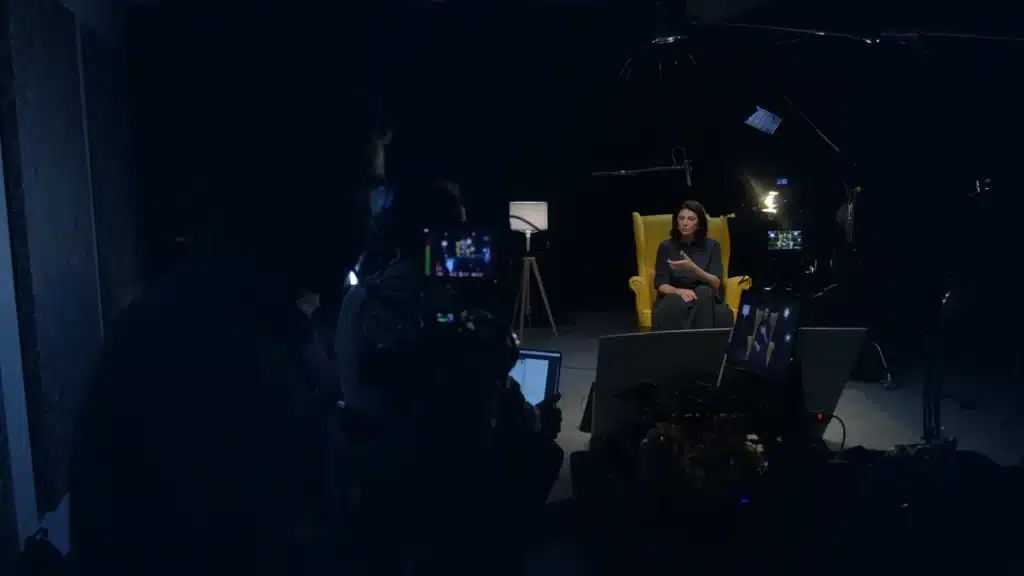
Why “Tragic Awakening” must be seen
Depending on your understanding of antisemitism, “Tragic Awakening” may be a jolt of caffeine you need to become a little more alert, or it may be the smelling salts required to bring you out of hibernation to protect a nation. It’s provocative but accessible, direct yet layered. One of its most valuable lessons is that sometimes, the answer to a difficult question is hiding in plain sight.
Rogan — and many others — would benefit from having Shore as a guest.
In the battle against antisemitism, those who hate the Jews hope their numbers will prevail. Osman, however, expresses hope that just as the Jewish people rose from the ashes of the Holocaust to build the State of Israel, they will rise again — if united.
“We have to stand up in the face of the values that we carry,” Schwartz said.
Editor’s note: Rabbi Raphael Shore is the Executive Chairman of OpenDor Media, Unpacked’s parent company.
Originally Published Apr 18, 2025 11:56AM EDT

